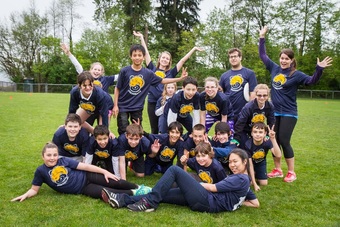
Most of our students come from families that would not normally choose an independent school for their child, but we are a school of "second choice", someone that they turn to when their first choice school (public, private, or parochial) is unable to meet the needs of their daughter or son. As result of the financial stretch that this puts on our families, we work hard to help our students to develop the skills and attitudes that will enable them to successfully transition back into a regular classroom in two or three years. It is challenging, often frustrating or puzzling, but always rewarding to find that individual pathway that will allow each of our students to navigate the mainstream back in her or his home school.
We have always relied heavily on assistive technology (SmartBoards; laptops; iPads; etc.) but last year we made the move to become a Google Domain, and we have never looked back! All of a sudden, we had the power and the flexibility to give our students what they needed, a platform that could transition them easily between KGMS and home and eventually back to their next school of choice.
Here are 5 reasons why is works for us, and our kids:
1. It is universal. Even within our school we use two different platforms (MacBooks in the elementary and Chromebooks in the high school). Using Chrome, this no longer matters. Every machine in the school can communicate with one another and, even more importantly, can communicate through the cloud with every student and teacher and parent device at home as well;
2. It is collaborative. Students can share their work with each other and submit it for editing by either a peer or a teacher with a tap of a key. No more memory sticks, or printer issues, or "dog-eaten" paper assignments. When something is ready it can immediately be delivered - even if it is 9 o'clock at night from the dining room table;
3. It is powerful. Google Classroom and apps such as Google Docs or Slides or Sheets or, especially for us, third party extensions such as "Read and Write for Google" have given our students all of the tools that they need for the research of topics and the production of their results all in one package;
4. It is simple. Introducing Chrome to our students (and especially our staff!) has been the easiest software roll-out that I have ever seen. It looks familiar, it is easy to understand, and it doesn't seem to scare off even the most timid users; and,
5. It is cheap! Okay, I'll admit it, this was definitely a factor when we were looking at the next generation of assistive technology for our students. Not only is the hardware (Chromebook) inexpensive, but we have been able to replace pricey software such as MS Office or Kurzweil or DragonSpeak with a much more cost-effective alternative.
Sorry if this post sounds a bit like an ad! But to be honest, this summer, if you are looking at ramping up your strategies for working with students with learning differences - give this a try. It is making a world of difference for our students, parents and staff.



 RSS Feed
RSS Feed
